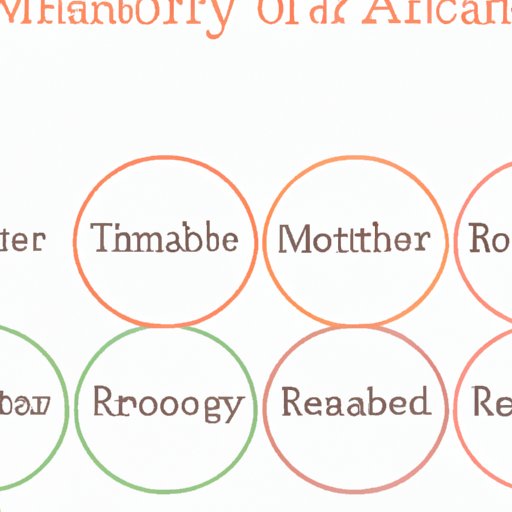Introduction
Pregnancy is an exciting but daunting experience for many women, filled with anticipation and joy, as well as exhaustion and fear. One of the most common questions that soon-to-be parents ask is “how many months am I pregnant?” While the answer to this question may seem simple, there are actually several factors that can affect the length of pregnancy.
An Overview of Pregnancy Length: How Many Months Are You Pregnant?
The average length of a full-term pregnancy is 40 weeks, or 280 days, from the first day of the last menstrual period (LMP). However, the actual length of pregnancy can vary due to a variety of factors, including the mother’s health, age, lifestyle, and the number of fetuses she is carrying.
Understanding the Stages of Pregnancy: How Many Months Do You Carry a Baby?
Pregnancy is divided into three main stages, or trimesters. The first trimester lasts from the first day of your last menstrual period until 12 weeks gestation. During this time, the baby’s major organs and systems are developing. The second trimester begins at 13 weeks and ends at 26 weeks gestation. This is typically the most comfortable period of pregnancy, as the morning sickness and fatigue of the first trimester have usually subsided, and the baby is not yet large enough to cause discomfort. The third trimester begins at 27 weeks and ends at the end of pregnancy, usually around week 40.
Breaking Down the Duration of Pregnancy: How Many Months Does It Take to Have a Baby?
In order to estimate how many months you are pregnant, it is important to calculate your due date. The due date is calculated by adding 280 days (or 40 weeks) to the first day of your LMP. However, it is important to note that only 5% of babies are born on their exact due date; most babies are born between 38 and 42 weeks gestation.
Exploring the 9-Month Journey of Pregnancy: How Long Is Each Month?
Each month of pregnancy brings new changes and developments in both mom and baby. During the first month, the embryo is forming, and the placenta and umbilical cord are beginning to develop. During the second month, the embryo begins to take shape, and organs and body systems start to form. By the third month, the baby’s facial features start to become more defined, and the arms and legs grow longer. During the fourth month, the baby begins to move and kick, and the lungs and brain continue to develop. In the fifth month, the baby’s skin begins to thicken and the bones become harder. During the sixth month, the baby’s eyes open and the baby continues to gain weight. In the seventh month, the baby’s lungs are fully developed, and the baby moves into position for delivery. During the eighth month, the baby’s head moves down into the pelvis in preparation for birth. In the ninth month, the baby continues to gain weight and the mother will start to feel more frequent contractions.
Examining the Length of Each Trimester: How Many Months in Each Stage?
The first trimester lasts from the first day of your last menstrual period until 12 weeks gestation. The second trimester lasts from 13 weeks to 26 weeks gestation. The third trimester lasts from 27 weeks until the end of pregnancy, which is typically around the 40th week.
The Timeline of Pregnancy: How Many Months Does It Take to Give Birth?
During the final weeks of pregnancy, the baby will continue to gain weight and the mother will begin to experience Braxton-Hicks contractions. The delivery process will vary depending on the type of delivery and the individual woman’s situation. In general, labor can last anywhere from a few hours to several days.
Conclusion
Pregnancy is a unique and amazing experience for every woman. Knowing how many months you are pregnant can help you better prepare for the arrival of your little one. On average, a full-term pregnancy lasts about 40 weeks, or nine months. However, the exact length of pregnancy can vary due to a variety of factors. Understanding the stages of pregnancy and the changes that occur during each month can help ensure a healthy and safe delivery.
(Note: Is this article not meeting your expectations? Do you have knowledge or insights to share? Unlock new opportunities and expand your reach by joining our authors team. Click Registration to join us and share your expertise with our readers.)
